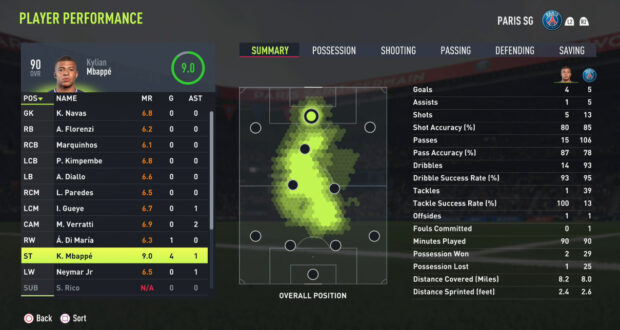In the world of modern football, data analytics has emerged as a game-changer, providing teams and coaches with valuable insights that can shape strategies, player development, and overall performance.
While traditional sources of data, such as match statistics and player tracking, have been pivotal in this evolution, a new and unexpected player has entered the field – EA SPORTS FIFA, the popular video game franchise.
What was once considered a recreational activity has now become an unexpected treasure trove of data that holds the potential to revolutionize football analytics.
The Rise of Football Analytics
Football has come a long way from being a sport driven solely by gut feelings and subjective observations. With the advent of advanced technology, data collection tools, and powerful computing, the sport has entered an era of data-driven decision-making.
Teams are now collecting vast amounts of data, ranging from player movement on the field to complex tactical maneuvers, to gain a competitive edge.

Analytics in football typically involves the analysis of various metrics, including player performance, team formations, ball possession, passing accuracy, and more.
These insights are used to formulate strategies, optimize player development programs, and fine-tune game plans. However, the introduction of data from virtual football matches, as seen in EA SPORTS FIFA, has opened up new dimensions for understanding the beautiful game.
The Virtual Data Goldmine
EA SPORTS FIFA, known for its realistic simulation of football matches, generates an immense amount of data with each game played. This data captures a wide array of information, including player movement, passing patterns, shooting accuracy, defensive positioning, and even psychological aspects like decision-making under pressure.

While this data is primarily intended to enhance the gaming experience, its potential applications in real-world football analytics are far-reaching.
1. Player Performance Analysis
Virtual football games can provide a platform for assessing individual player performance under various scenarios. Data from FIFA games can offer insights into how players perform against specific opponents, adapt to different formations, and handle high-pressure situations.
Coaches can identify a player’s strengths and weaknesses and tailor training regimens accordingly.
2. Tactical Insights
EA SPORTS FIFA allows players to experiment with different formations, strategies, and playing styles. Analyzing the gameplay data from FIFA can reveal emerging tactical trends and their effectiveness.
Teams can explore unconventional formations or strategies that may not have been widely considered but prove successful in the virtual realm.
3. Predictive Analysis
The vast amount of data collected from virtual matches can be used for predictive modeling. By analyzing historical FIFA data, teams can predict potential outcomes of real-world matches, simulate scenarios, and even predict player injuries based on fatigue levels and match history.
🇪🇸✅ 2010
🇩🇪✅ 2014
🇫🇷✅ 2018
🇦🇷❓ 2022EA SPORTS has got it right since 2010 👀 See how the FIFA World Cup played out in the #FIFA23 simulation and have your say 🏆 https://t.co/rQ24tEwrTg pic.twitter.com/EuiyhQnPQI
— EA SPORTS FC (@EASPORTSFC) November 8, 2022
This can also be helpful for online sports betting as it could predict wins or loses for specific teams or outcomes of major competitions. In fact, EA SPORTS have correctly predicted every FIFA World Cup winner since 2010 thanks to their in-game simulations.
4. Player Scouting and Recruitment
Virtual football data can aid in the scouting and recruitment process. Aspiring talents and unknown players who perform exceptionally well in the virtual world could catch the attention of scouts, offering a new angle for identifying future stars.
5. Fan Engagement and Game Development
Analyzing player preferences and behavior within the game can provide insights into fan engagement and interest. Game developers can use this data to fine-tune the virtual experience, making it more realistic and appealing to players.
Challenges and Considerations
While the potential of using EA SPORTS FIFA data for real-world football analytics is promising, several challenges and considerations must be addressed:
1. Data Accuracy and Validity
The data generated in EA SPORTS FIFA games is inherently simulated and may not fully replicate real-world conditions. There is a need to validate the accuracy of the data and ensure that the insights drawn from virtual matches align with real-world observations.
2. Contextual Interpretation
Interpreting virtual data in the context of real-world football requires a deep understanding of both the game mechanics and the sport itself. Coaches and analysts need to decipher which insights are transferable and actionable at the professional level.

3. Ethical Concerns
Collecting and analyzing player data, even from virtual matches, raises ethical concerns related to player privacy and consent. Clear guidelines and ethical frameworks should be established to ensure responsible data usage.
4. Integration with Existing Analytics
Integrating data from virtual matches with traditional football analytics tools poses technical challenges. Seamless integration is essential to harness the full potential of this data source.
The Future of Football Analytics
EA SPORTS FIFA’s impact on football analytics represents a convergence of technology, entertainment, and sports. As the gaming industry continues to evolve, the amount and quality of data generated by virtual matches will only increase, opening up new avenues for exploration.
The synergy between virtual and real-world football data is likely to reshape coaching methodologies, player development programs, and tactical strategies. Teams that embrace this novel data source stand to gain a competitive edge by unearthing insights that may have been overlooked through traditional analytics alone.

In conclusion, the unexpected marriage of EA SPORTS FIFA and football analytics presents a unique opportunity for the sport’s evolution.
By tapping into the wealth of data generated in virtual matches, teams can gain deeper insights into player performance, tactical innovations, and predictive modeling. As football continues to embrace the digital age, the fusion of virtual and real-world data could redefine the way the game is played, coached, and experienced by fans worldwide.
 FIFA Infinity The Absolute FIFA Site
FIFA Infinity The Absolute FIFA Site




